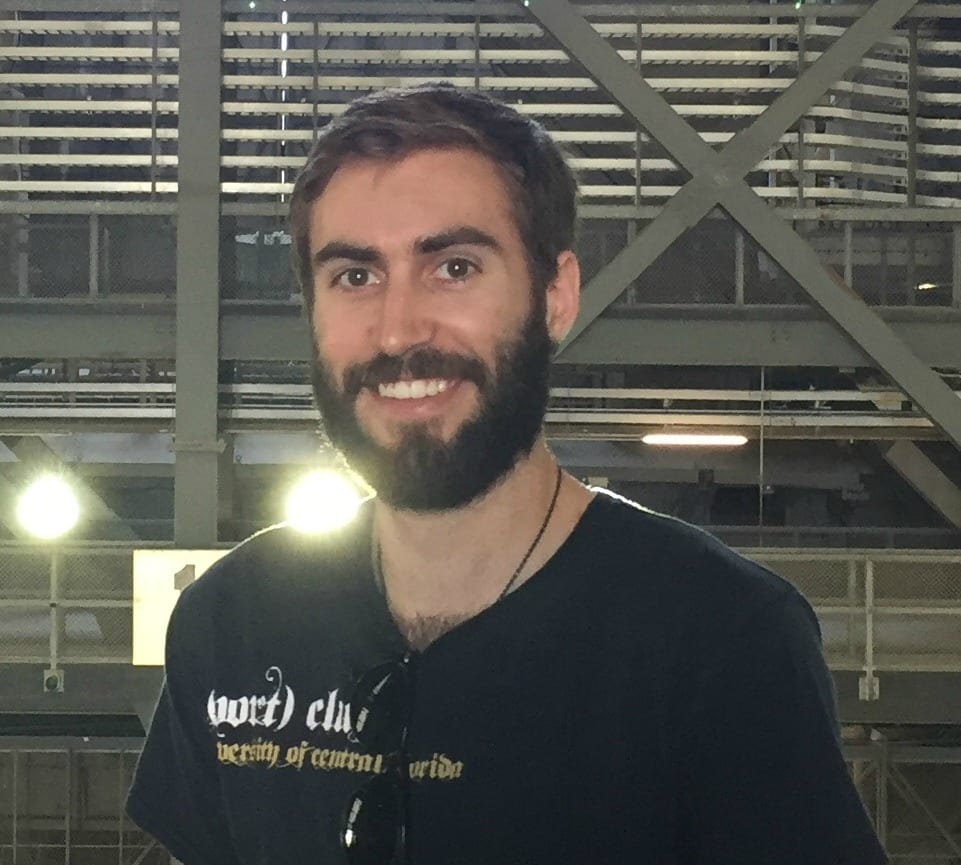Ph.D. Student Makes Major Changes

William Volante, Ph.D. student, has been at UCF for seven years, but that doesn’t mean he hasn’t finished. In fact, he’s just begun.
Volante is from Gainesville, and out of high school was interested in engineering. Despite having a large state university in his own backyard, he wanted to go to UCF. He began his undergrad career in 2010, but realized engineering might not be for him.
“I discovered a piece of the puzzle that I thought was missing in engineering,” he said. “The human. While I enjoyed working and building things in the engineering sense, I missed the connection to people and began to wonder more about the user end of the experience.”
This led him to psychology, and more specifically, the field of Human Factors. This branch of psychology is dedicated to the interaction of people and technology. Volante switched his undergraduate degree to psychology, and now conducts research at the Minds in Technology 2 lab, run by Peter Hancock, Ph.D.
“Dr. Hancock always encourages us to pursue our own research endeavors and provides us with both the freedom and support to do so,” Volante said.
Volante gives an example of WWII fighter planes and how technology can affect human performance and vice versa.
“The controls for the landing gear and ejector seat were located right next to each other, and even worse; they looked almost identical,” he said. “This was designed in such a way due to the optimization of the wiring the plane, but came with unexpected consequences. Pilots were mixing them up, especially in stressful situations.”
The study of Human Factors takes a look at user experience such as the WWII example, and tries to find ways to improve it. Volante has worked on researching various projects, including astronaut scheduling. He interviewed NASA astronauts, mission operators and other people included in the process.
“One critical issue that arises with space missions is the high number of tasks that need to be completed and the strain this puts on the astronauts,” Volante said. “Often their schedules are jam packed with all of the different things they have to do in the short time they are in space.”
They also studied the issue of sleeping in space, and how difficult it can be for astronauts. Volante loved this research project, as he grew up fascinated by space as a child. He has also worked on research projects involving virtual reality and language perception.
“With language perception, we are also incorporating different cultures into the mix,” Volante said. “We’ve been looking at how people perceive words differently, like in categories of probability, so words like always, never, sometimes.”
Participants rank the words on a scale of 0-100 in terms of how often they believe something will happen if described with that word. The research team is attempting to release this study in Germany, Japan and China to see how culture plays a role. While he’s done his fair share of projects, he’s undecided which path he will take when he graduates in 2020. Volante is glad he put himself out there and changed his major.
“I took a chance by completely switching my major, but it was in pursuit of something I was passionate about,” he said. “I also knew in order to have the opportunity to study what I was interested in, I’d have to get into grad school. But it wasn’t even a guarantee it would work out. Students should actively pursue what they are interested in and take the risk.”
